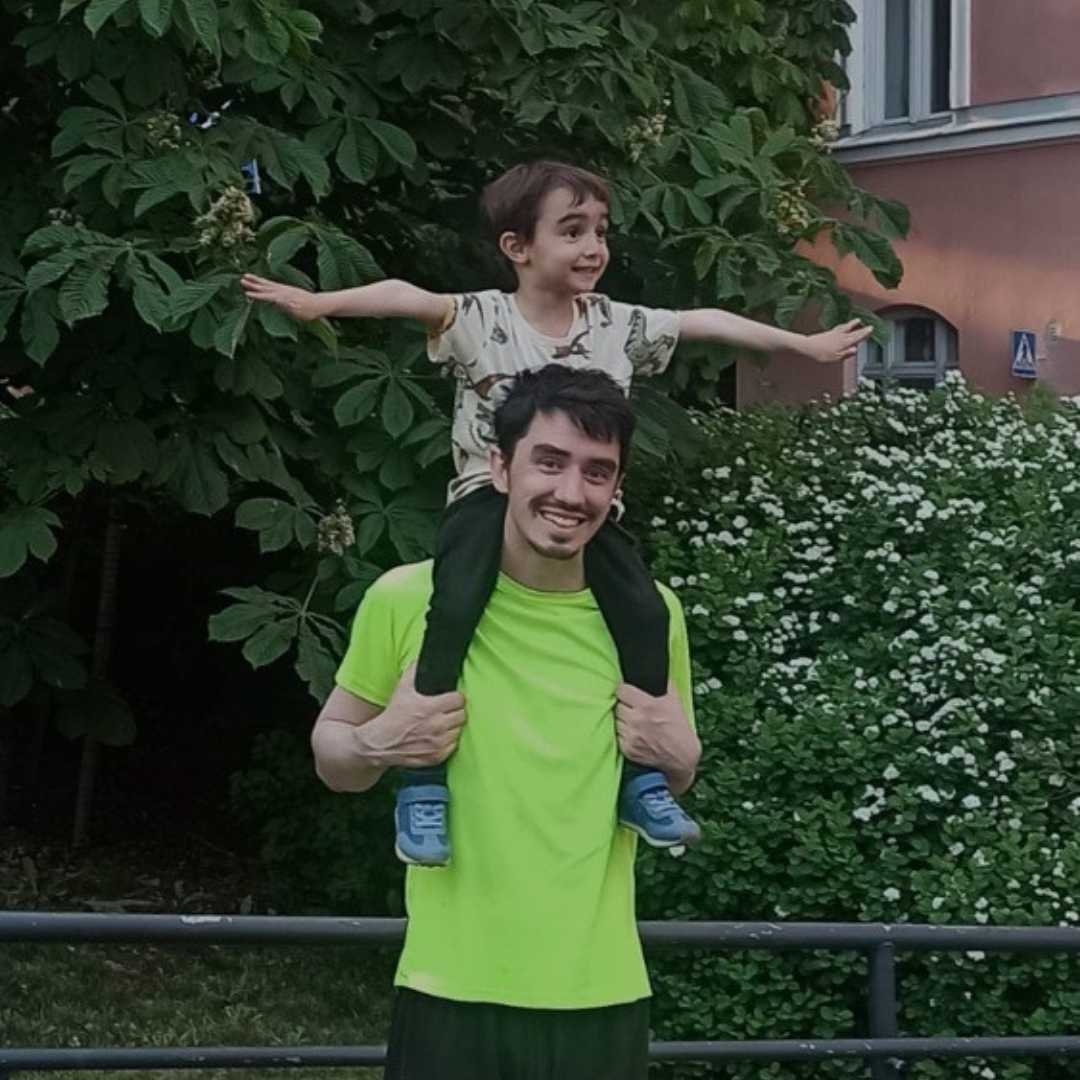My neighbour toruHaving recently moved to Helsinki, I find myself in a pretty international environment. In my building, you can hear different languages, with English being the main one. But, there's one language that's caught my attention: Japanese, spoken by a father to his son, Toru. Toru is a lively 4-year-old, and if you get a chance to talk to him, you'll notice his impressive vocabulary. What's even more remarkable is his proficiency in Japanese, exceeding expectations for his age. To celebrate Father’s Day, I interviewed Tai, Toro’s father, to understand the joys and challenges of being part of an intercultural family and raising a multilingual child in Finland. Throughout the interview, he emphasizes not comparing children's development and highlights the individual pace at which each child learns in an intercultural or multilingual family. "When my wife and I decided to start a family, I was determined to pass on the richness of Japanese culture and language to our child. Despite living in Finland, where Japanese speakers are scarce, I felt compelled to instill this multilingual aspect in our child's upbringing. It's been a conscious effort, even though it raised some challenges, like finding the right balance between languages and dealing with socialization. I was proactive in exposing my son to Japanese from an early age through activities like singing songs and reading books. Despite initial concerns, he developed linguistic capabilities quite fast. I also introduced Japanese characters early, and he now recognizes kanji. One of the main challenges was that my wife, while supportive, wasn’t fluent in Japanese (though fluent in four other languages), so there was initially a linguistic gap within our family that faded over time. Our multicultural friend group, consisting of various nationalities fluent in Japanese, further enriched our child's linguistic exposure. As Toru grew older, questions arose about the challenges of raising a multilingual child. We navigated the complexities of socialization, especially in a country like Finland, where our son might not always find peers who share his language. The dynamics shifted over time, and we faced dilemmas about language choices in daycare and social interactions. I often wondered if I'm his only point of contact with his language, will he learn it properly?"  To give a bit of a background history, in his first two years of life, we were in India primarily, and I made a proactive effort to speak with him daily, sing children's songs, and read books in Japanese. I often wondered if I'm his only point of contact with his language, will he learn it properly? But I was pleasantly surprised how fast he developed his linguistic capabilities. When he started to communicate and have conversations in Japanese, I felt very confident, and it worked out how I was hoping. Both my wife and I have been proactive about encouraging his verbal capabilities in Japanese and English. Interviewer: Your hard work is paying off, but have you run into any issues with Toro speaking Japanese in a Finnish-speaking place? Do you notice any problems for him when people around don't speak Japanese, despite your efforts? And is it tough raising a kid outside Japan, especially in Finland where people speaking a different language might confuse Toro when you're out and about? Yeah, there's certainly a concern, especially regarding Toru's Japanese. It's hard to predict the future, but I've seen the typical story in America where immigrant families speak their native language at home, yet their kids end up only learning English. These kids often refuse to speak their parents' language once they start school or reach a certain age. I'm not sure if that will happen with Toro, but as of now, Japanese is undoubtedly the most significant language in his life. He's completely satisfied with it, communicates freely in Japanese all day, and even when he plays alone, he uses Japanese to create scenarios with characters like Peppa Pig and superheroes. One thing that worried some people was the idea of code-switching, where languages get mixed up. Surprisingly, Toru keeps English and Japanese completely separate. He never mixes them, and when he was around 2 or 3 years old, I was shocked to see how easily he could translate between the two languages idiomatically. This convinced me that our brains are built for multilingualism if raised in the right environment. Social situations, especially, have had their challenges. Toro sometimes feels left out when interacting with Finnish-speaking children, and there's a reluctance to engage with them. It's something we're mindful of, and if we were to stay in Finland long-term, we'd explore ways to introduce Finnish gradually. I think that can really be a challenge that children coming to a country face if they get put in daycare from day one and they don't speak the local language; I think they can really have these feelings of alienation and isolation." I've been super mindful of the words I use with my son, Toru, constantly observing what he understands and what he doesn't. I had the luxury of spending a lot of one-on-one time with him in his first two years, unlike some parents who work full time. Being with Toro every day allowed me to teach him things extensively. Maybe it's because I'm his main language contact, but I know every word he knows. Overall, it's been a really rewarding experience as a father, sharing this language with him, interacting with my Japanese friends, and seeing that my son can interact with their children. And I think it's really a great experience.
Interview by Patricia Marques Kersull
0 Comments
Leave a Reply. |
blogi - blogAjatuksia ja kokemuksia elämästä kahden kulttuurin keskellä.
Reflections and experiences from the life of intercultural families. kategoriat
All
osallistuToivotamme sinut lämpimästi tervetulleeksi osallistumaan blogiyhteisöömme: lue, kommentoi ja kirjoita!
Kirjoittajina voivat toimia kaikki kahden kulttuurin arkea elävät ja aiheesta kiinnostuneet. Kynnystä kirjoittamiselle ei tule nostaa liian korkealle ja kirjoittaa voi joko omalla nimellä tai nimimerkillä. Blogissa esitetyt näkökannat ja mielipiteet ovat kirjoittajien omia, eivätkä edusta Familian kantaa. Kahden kulttuurin arki on itsessään kiinnostavaa ja siitä kirjoittaminen voi avata myös itselle uusia näkökulmia! Blogikirjoituksia voi tarjota sähköpostitse (info@ familiary.fi) tai yhteydenottolomakkeen kautta. Lopullisen valinnan julkaistavista jutuista tekee Familian henkilökunta. Tervetuloa mukaan! participate!We warmly welcome you to participate in our blog community: read, comment, and write!
Anyone who lives and works in the world of intercultural families and is interested in the topic is welcome to contribute. The threshold for writing should not be too high, and you can write either under your own name or under a pseudonym. Keep in mind that the views and opinions expressed in the blog are those of the authors and do not represent the position of Familia. The everyday life of intercultural families is interesting and writing about it can also open new perspectives for you! Your story matters and helps to raise awareness about the opportunities and challenges within intercultural families. Blog contributions can be submitted by e-mail (info@ familiary.fi) or via our contact form. Final selection and edition of the stories to be published will be conducted by our staff. Welcome to join us! |
|
|
© Familia 2024


 RSS Feed
RSS Feed

